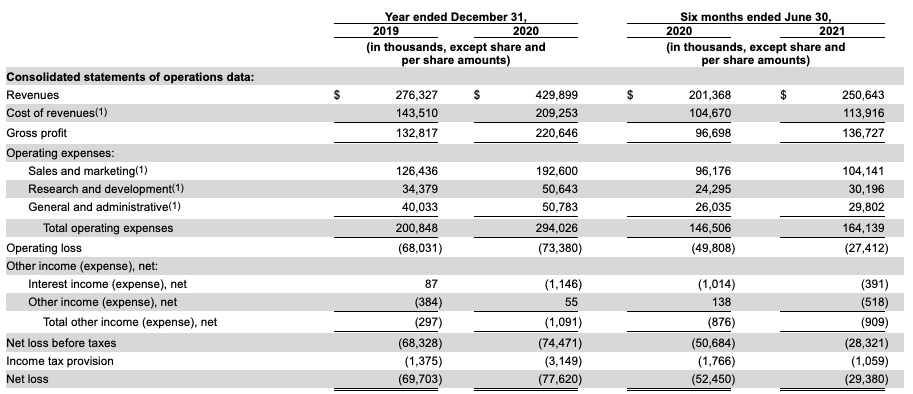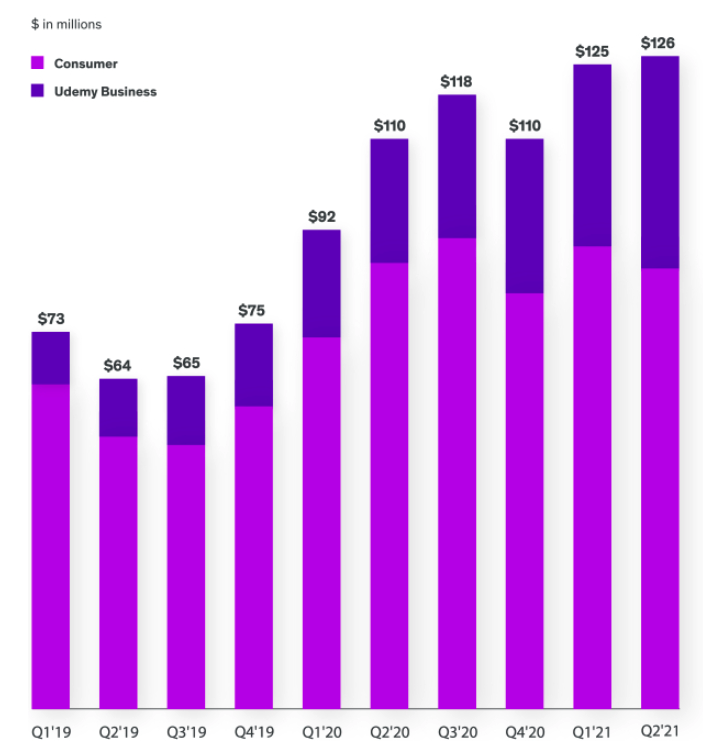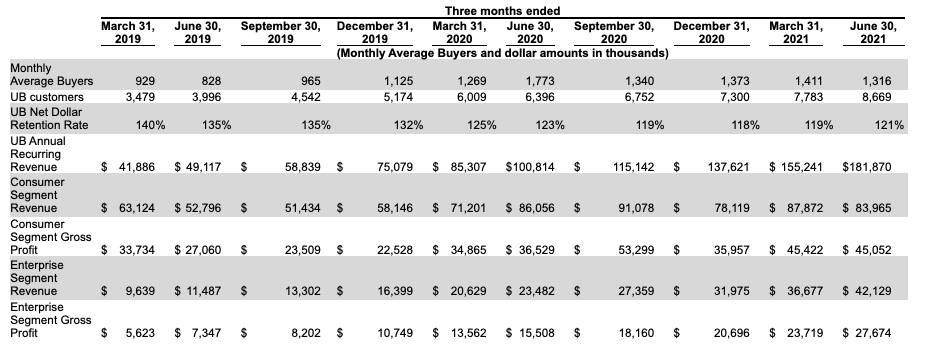After digging into the Rent the Runway IPO filing this morning, we’re turning to Udemy.
The Udemy offering comes in the wake of the successful Duolingo IPO earlier this year. And the company’s debut may prove to be the final major edtech IPO ahead of Byju’s eventual debut — how well Udemy performs in its public offering could impact others in its market, including some incredibly wealthy education technology players.
The Exchange explores startups, markets and money.
Read it every morning on Extra Crunch or get The Exchange newsletter every Saturday.
So, how does the company’s growth profile appear after the pandemic-powered wave of demand for edtech has passed?
In the case of Udemy, we’re looking at an online learning service that raised north of $300 million while private. A $50 million Series F raised in late 2020 valued the company at a touch over $3.2 billion, per Crunchbase data.
For Lightbank, Insight Partners, Norwest Venture Partners, Mindrock Capital and Tencent, the company’s IPO is a material liquidity event; there’s lots of capital riding on its success.
 The edtech company is an interesting two-part business, with one piece of its operations aimed at consumers and the second at businesses. To understand how healthy Udemy is, we’ll have to dig into each half of its business model — we’ll also want to know what’s happening to the company’s aggregate revenue mix and which direction it’s leaning in recent quarters.
The edtech company is an interesting two-part business, with one piece of its operations aimed at consumers and the second at businesses. To understand how healthy Udemy is, we’ll have to dig into each half of its business model — we’ll also want to know what’s happening to the company’s aggregate revenue mix and which direction it’s leaning in recent quarters.
Sound like fun? I’m super stoked to get into this one. So, let’s.
Udemy’s business through the pandemic
From 2019 to 2020, Udemy grew from $276.3 million in revenue to $429.9 million, or 55.6%. That’s quite a lot for a company that has already reached material scale, or revenues of $100 million and above. More recently, in the first half of 2021, Udemy posted $250.6 million in total revenues, up 24.5% compared to H1 2020.
But we expected Udemy to grow more slowly after its pandemic bump, frankly, so to see the company’s revenue growth decline into 2021 is not a huge shock. How investors value a slower-growing — but larger and more profitable — edtech company will be interesting to watch.
Not that Udemy actually makes money. It does not. But it is losing less money over time:

If you want to get a net income number excluding the cost of share-based compensation, you can deduct $20.6 million from its H1 2020 number and $16.5 million from its H1 2021 figure. The latter calculation will get you down to less than $13 million in losses during the first half of 2021 at Udemy. That’s far closer to profitability than the company has managed in prior periods, indicating that Udemy enjoyed some operating leverage during the pandemic, cutting losses while its revenues expanded.
Revenue mix
We’re going to break our general rule of not including marketing-friendly charts in our S-1 teardowns for the following exception:

I love this color scheme, no bullshit. You can feel the change in the company’s revenue mix in this chart. Especially if you compare the columns for Q4 2020 and Q2 2021.
Per the company, here are the key notes regarding revenue mix:
In 2019 and 2020, 82% and 76%, respectively, of our revenue was derived from our consumer offering. For the six months ended June 30, 2020 and 2021, 78% and 69%, respectively, of our revenue was derived from our consumer offering.
In 2019 and 2020, 18% and 24%, respectively, of our revenue was derived from our [Udemy Business] offering. For the six months ended June 30, 2020 and 2021, 22% and 31% of our revenue was derived from our [Udemy Business] offering.
Consumer revenue share at Udemy went from 82% in 2019 to 69% in the first half of 2021, with the pace of change appearing pretty strong and consistent. In short, Udemy is in the process of changing from a consumer-first company to a business-first company, in customer (revenue) mix terms.
It’s probably good news for the edtech giant. Why? Because “[s]ubstantially all of our consumer revenue is derived from consumer learners’ enrollment to individual courses on our online platform,” Udemy reports. That sounds like single-shot purchases, instead of long-term subscriptions, yeah?
But in the case of its sales to other companies, Udemy reports that “[t]he majority of our customers subscribe to our [Udemy Business] offering through one-year contracts, although a growing number of our customers subscribe through multiyear contracts. Subscription fees are primarily based on the number of license seats.” That, in contrast, is B2B SaaS, which investors love.
So Udemy is evolving from a consumer-facing service without recurring revenues to a B2B SaaS company. The latter category of revenues has truly scaled at the company: 18% of Udemy’s 2019 revenues came from its business offering, totaling $52.5 million, compared with 31% worth $77.7 million in H1 2021. In simpler English, Udemy’s business revenues in the first half of 2021 were nearly 50% greater than its full-year 2019 business top line.
Udemy expected that we’d be interested in the business side of its operations, providing a sheaf of numbers for us to nose into more deeply. The net dollar retention rate of Udemy Business revenues — see, I told you it wanted to talk SaaS! — was 121% in Q2 2021, the best result for the revenue category since Q2 2020. And Udemy reckons that its business-focused annual recurring revenue reached $181.9 million in the second quarter of 2021.

If you follow the consumer segment revenue line, you can see the company’s pandemic bump, especially from Q4 2019 through Q3 2020. Those incomes then declined, while business recurring revenues kept rising. Given the above numbers, we can consider Udemy as a B2B SaaS business that has a legacy consumer business attached, perhaps, from a valuation perspective.
The profit question
We briefly touched on net losses in our discussion of growth at the company. Now let’s look at adjusted profitability, as I suspect that public-market investors will be paying attention to the figures:

All those figures point in the right direction, with Udemy nearly reaching adjusted EBITDA breakeven in the first half of 2021. That should give investors confidence that the company’s days of adjusted losses could fade into history. Everyone likes a nice profit when there’s growth attached, after all.
Udemy is a somewhat stable consumer edtech offering inside a recurring-revenue B2B product. If we only valued Udemy on its business revenues, at its final private-market valuation, it would be worth 4.5x its Q2 2021 ARR. That’s incredibly cheap. And its consumer business has value as well.
So, we expect Udemy to price above its final private-market valuation. Where is the next question. More when we get a first pricing interval.































Comment